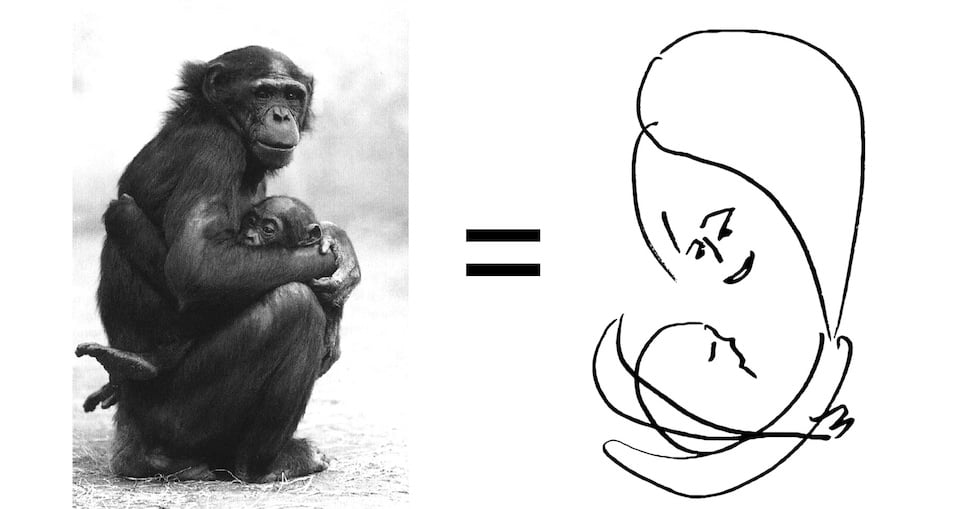The Great Exodus
30. Infancy
This is our Infantman stage, the love-indoctrination, nurturing period.
The species: our ape ancestor—20 to 5 million years ago
The individual: 0, 1, 2 and 3 years old

Drawing by Jeremy Griffith © 2006 Fedmex Pty Ltd;.and photograph of Matata by Manny Rubio
In humanity’s journey, infancy was the period when our ape ancestors gradually developed the fully integrated state through the processes of love-indoctrination and mate selection of integrativeness. As explained in Section 25, a side effect of the development of integration was that it liberated consciousness from the instinctive blocks to its development that exist in non-primate species. In fact it was during the development of love-indoctrination that consciousness first appears. Illustrative of this is the ability of primates to effectively manage events over short time intervals, such as chimpanzees understanding the relationship of events sufficiently to reason, and thus effectively plan ahead, that by stacking boxes up they can reach a banana tied to the roof of their cage. Another demonstration of the emergence of consciousness is the ability to sufficiently understand how events are related to realise that you are at the centre of the constantly changing array of events around you—to recognise the existence of self or ‘I’. Experiments with the great apes have shown that they are able to recognise themselves Page 140 of
PDF Version in mirrors and photographs. In fact the development of consciousness in chimpanzees, gorillas and orangutans is said to parallel humans’ conscious development up to the age of two, at which point the development of consciousness in the great apes stalls, while humans’ continues to progress.
In the case of individual humans today, we grow up in a world already extremely upset which means that a great deal of our adjustments are going to be to the effects of encountering that upset. However, we can expect the basic developments and adjustments a conscious individual makes as it progresses through the various stages with ages that occur as a result of the development of consciousness to still be apparent. In the case of our infancy, Olive Schreiner said, in the quote of hers that was included at the end of Section 23, that the ‘The souls of little children are marvellously delicate and tender things, and keep for ever the shadow that first falls on them…the first six years of our life make us; all that is added later is veneer’. Able to understand how critically important nurturing has been in creating our moral sense we can now understand how true this statement is. The closest the old world of denial has been able to come in acknowledging the reason for the importance of these first few years of our life in the formation of our character was to say that this is the time when ‘we are most impressionable’.
Since it is not until two years of age that infants become sufficiently able to make sense of experience to recognise the existence of self or ‘I’, we can expect that while a pre-two year old infant can fail to have its instinctive expectations of unconditional love met, it isn’t until infants are two that they can gain a conscious appreciation of their situation. Then, finding themselves in the midst of a massively upset world, their conscious self must be distressed by it. Parents are well aware of the crisis that occurs when infants become two because they refer to the tantrums and stubborn uncooperativeness of that age as the ‘terrible twos’. This has been evasively blamed on the teething that occurs around that age but as humanity comes out of its fog of denial it is going to see that the real problem was that the infants were registering their first protests at the ‘wrongness’ or imperfection, in terms of their instinctive expectations, of the world they have encountered. The extraordinary extent of the alienation in the human race now has to be an immense shock to infants as their consciousness awakes.


